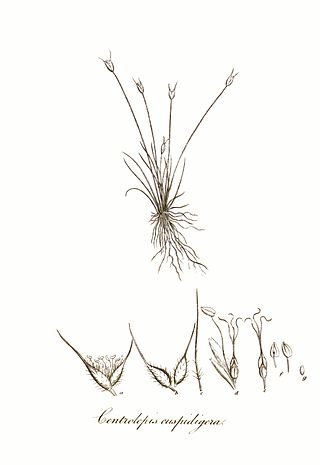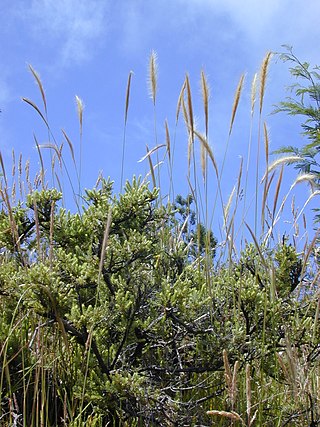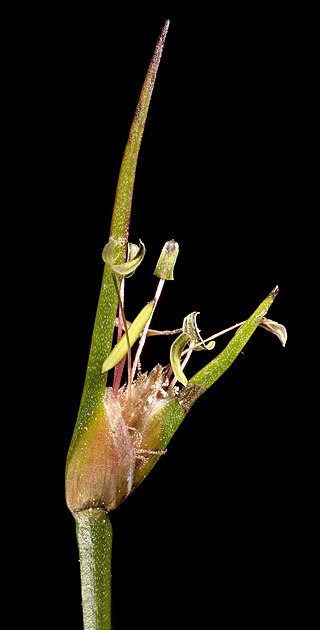
Centrolepidaceae are a family of flowering plants now included in Restionaceae following APG IV (2016). The botanical name has been recognized by most taxonomists.

Centrolepis is a genus of small herbaceous plants in the family Restionaceae known as thorn grass scales, with about 25 species native to Australia, New Zealand, New Guinea, and south-east Asia as far north as Hainan Dao. APG III system classifies this genus in the Centrolepidaceae family.

Atriplex cinerea, commonly known as grey saltbush, coast saltbush, barilla or truganini, is a plant species in the family Amaranthaceae. It occurs in sheltered coastal areas and around salt lakes in the Australian states of Western Australia, South Australia, Tasmania, Victoria and New South Wales.

Pomaderris paniculosa, commonly known as scurfy pomaderris, is a species of flowering plant in the family Rhamnaceae and is native to Australia and New Zealand. It is a shrub with hairy branchlets, round to elliptic or egg-shaped leaves with the narrower end towards the base and panicles of hairy, cream-coloured to greenish, sometimes crimson-tinged flowers.

Agrostis magellanica is a species of grass. It has a circumpolar distribution and is native to many subantarctic islands in, and the coasts bordering, the Southern Ocean.
Centrolepis ciliata is a species of plant of the Restionaceae family. It is found in New Zealand.

Centrolepis pallida is a species of plant of the Restionaceae family. It is found in New Zealand.

Dichelachne crinita , commonly known as the longhair plume grass, is a type of grass found in Australia, New Zealand and islands of the Pacific Ocean. It is often seen on sandy soils near the sea as well as woodlands. The flowering panicles are open and feathery at maturity. The grass may grow up to 1.5 metres (5 ft) tall. Crinita, the specific epithet, is derived from Latin (hairy).

Carex sylvatica is a species of sedge found in deciduous woodlands across Europe. It typically reaches 60 cm (24 in) tall, and has an inflorescence made up of 3–5 pendent female spikes and a single male spike. It is also used as a garden plant, and has been introduced to North America and New Zealand.
Centrolepis glabra, commonly known as smooth centrolepis, is a species of plant in the Restionaceae family.

Kunzea similis is a species of flowering plant in the myrtle family, Myrtaceae and is endemic to a small area along the south coast of Western Australia. It is a shrub with linear to lance-shaped leaves with a single vein, and spherical groups of between four and ten pink flowers on the ends of shoots.
Centrolepis alepyroides is a species of plant in the Restionaceae family and is found in Western Australia.

Centrolepis aristata, commonly known as pointed centrolepis, is a species of plant in the Restionaceae family and is found in areas of southern Australia.
Centrolepis caespitosa is a species of plant in the Restionaceae family and is found in Western Australia.

Centrolepis drummondiana is a species of plant in the Restionaceae family and is found in Western Australia.
Centrolepis humillima, commonly known as dwarf centrolepis, is a species of plant in the Restionaceae family and is found in Western Australia.
Centrolepis mutica is a species of plant in the Restionaceae family and is found in Western Australia.

Centrolepis pilosa is a species of plant in the Restionaceae family and is found in Western Australia.

Centrolepis polygyna, commonly known as wiry centrolepis, is a species of plant in the Restionaceae family and is found in Western Australia.
Olearia strigosa, commonly known as bristly daisy bush, is a species of flowering plant in the family Asteraceae and is endemic to the south-west of Western Australia. It is an erect shrub with linear leaves and blue or purple, daisy-like inflorescences.













